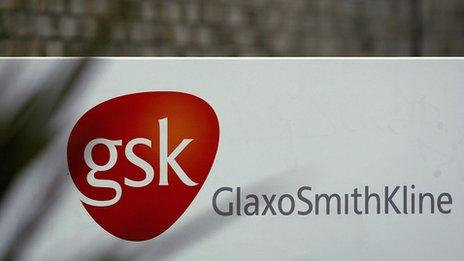Foreign investors show confidence in Scotland
- Published
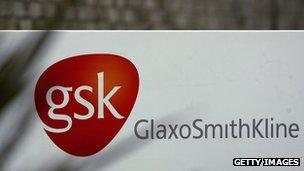
Glaxo put a "mega-investment" in Cumbria but also boosted Irvine and Montrose
The evidence of economic meltdown in the event of independence is not stacking up as its opponents had hoped.
It may be that some companies are choosing not to invest in Scotland because of uncertainty over its constitutional future. But if so, most are keeping quiet about it.
It was certainly a blow to the life science sector that GlaxoSmithKline last week chose to put its £350m mega-investment into Cumbria.
But chief executive Sir Andrew Witty last week was careful to avoid saying England had won over Scotland because of the uncertainty issue.
It was down to not enough space at GSK's Montrose plant and preferable expertise at Ulverston over the one at Irvine.
Instead, he announced £100m of investment - a commitment to boost Montrose and Irvine, and not long after Montrose had faced the threat of closure.
Greenwash
I was out at the Irvine plant on the day of the announcement and impressed by the scale.
It produces 2,000 tonnes of antibiotic each year, one of the biggest such plants in the world, and the only one of its kind left in Europe.
And when the company said it was investing in renewable energy, it seemed to reach beyond mere greenwash when I learned that the annual energy bill for the Ayrshire plant alone is £15m.
The new wind turbines planned for the site should pay for themselves in six years, while there's a lot of biofuel to be generated from the microbes in large water treatment plants.
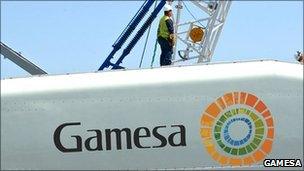
Gamesa chose to site its factory at Leith
Since then, Spanish renewables giant Gamesa has chosen Leith over Hartlepool on Teesside as the new manufacturing base for its offshore wind turbine blades and gear casings.
Like Iberdrola, owner of Scottish Power, it's based between Bilbao and Madrid, and understands the nuances of devolved power and independence movements, and I'm told its reckoning on Leith paid no attention at all to constitutional uncertainty.
Fruity figures
Lloyds TSB Scotland followed up with a business survey this week showing returns remain positive, if still very sluggish.
And the whisky industry delivered export figures for 2011 which are astonishing.
With the downturn still dragging down sales in the formerly booming Spanish market, it's putting on 23% growth by value in total overseas sales.
Brazil is up 48%, Singapore, which is the distribution point for much of east Asia, grew by 44%.

Whisky exports reached record highs in 2011 rising to £4.23bn
Traditional markets including the USA - biggest by value - were up strongly.
So was France, the biggest by volume.
Whisky accounts for around four-fifths of food and drink exports from Scotland.
There are somewhat more modest but still significant growth stories in selling seafood to the world, with more than half of £1.16bn food exports last year.
Overseas sales of fruit and vegetables are still relatively small but grew by more than 60% in 2011.
With windfarm developer Burcote and Samsung also committing to investment in Scotland's renewables sector in recent weeks, it's not just the weather and longer days that are lifting the spirits.
The evidence is there of the economy defying the gloom that pervaded much of winter.
And it shouldn't be a surprise if that re-shapes some of the economic debate surrounding the independence referendum campaign.
Royal question
There's another question in recent days which could have a big influence on Scotland's economic future, but which has played a strikingly small role in that debate: what's to become of Royal Bank of Scotland?
My BBC colleagues at Newsnight (take a bow, Joe Lynam) have been reporting that UK Financial Investments, which represents the taxpayer interest in the banks, is in advanced talks on selling a stake to Abu Dhabi's vast sovereign wealth fund.
It's been further suggested (take a bow, Financial Times) that Sheikh Mansour - he of Manchester City FC - is leading a consortium that could put £5bn into equity for a 14% stake, with a further £5bn in debt, to be converted into equity when the share price reaches a pre-agreed trigger.
Though RBS doesn't - or shouldn't - have a say in this, it should be music to the ears of Stephen Hester and the bank's executives.
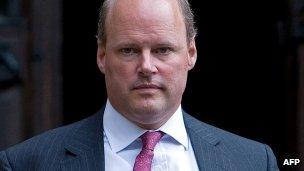
Selling a stake to Abu Dhabit could be "music to the ears" of Stephen Hester
It fulfils the chief executive's wish that the public stake starts to get sold off, as a signal that a return to normality is under way, if only slowly.
It may lead, as reported elsewhere, to a "voter backlash", because it would mean a sizeable loss on the original bail-out investment.
But a deal with Abu Dhabi may not be bad news for RBS staff at Gogarburn.
Gambling on a loss
If a sovereign wealth fund like that is willing to invest, it's a vote of confidence from a respected investor.
That resulted in a modest lift in the share price on the first day of trading after the news broke.
A loss on the first tranche could be followed up by compensating bigger profits on the rest - though that's a gamble, it's far from guaranteed.
It also means that the new shareholder would have a stake in holding RBS together - at least moreso than a trade sale to a large international bank that might wish to do to it what Mr Fred Goodwin did to ABN Amro when he (catastrophically) bought it in 2007.
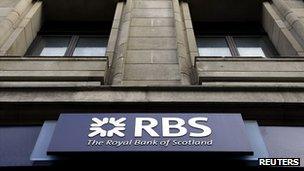
The government owns an 82% stake in the Royal Bank of Scotland
It's hard to see a break-up of RBS as being in Scotland's interests, however much Scots may share in the desire of the British public to seek revenge on RBS and bankers in general.
And yet it's strange how reluctant the Scottish government has been to comment on RBS.
It's partly that it raises questions of what might have happened to RBS and the economy if Scotland had been independent in 2008, when it became insolvent.
The answer to that is not clear, but it's not an issue that makes the SNP comfortable.
A senior government source tells me that it doesn't have much to say about the Abu Dhabi talks while details remain sketchy.
The 'broad position' is that the focus is on maintaining jobs, investment and the RBS headquarters and its functions in Scotland.
Any proposed sale of a tranche of it would be judged on that basis, looking to value for money for taxpayers, and ensuring jobs and investment in Scotland are supported.
Yet while Team Hester sheds bits of RBS at an astonishing pace - more than £700bn removed from the balance sheet in only three years - that hasn't been much of the economic narrative in Scotland.
We've heard little in Scotland about the loss of its insurance arm, now to be known as Direct Line Group.
Required to get rid of it by the European Commission, and having failed to find the conditions favourable for a trade sale, that division's being prepared for flotation in several tranches.
The first one will be by the end of this year, with all of it leaving RBS ownership by the end of 2014.
Now, we don't know if shareholders will come to see the best way of realising value out of RBS as coming from its breaking up, or from keeping it together, and building its value from being big and diverse.
But the bank's in an unhappy half-way house at the moment. The UK Government and taxpayer share an interest in increasing its value to return it to the market at a profit, yet there's an appetite from the public and politicians also want to punish bankers, to force RBS to lend more to business (even if it's not in the bank's interests) and where the impact of ring-fencing its investment bank remains very unclear and probably rather harmful to shareholder value.
And there's a telling line from the leaked letter about this from Vince Cable to the Prime Minister, where he said "the government should recognise RBS will not return to the market in its current shape", as if that's a view privately shared, but not more widely conceded.
So the pressure for break-up, even while selling it as a whole, continues to leave RBS's future uncertain.
The prospect of Arab ownership of much of RBS poses an interesting challenge to Britain's sense of itself.
While it has become used to finding it lose its place in the world in so many other sectors, notably in manufacturing, it has never had to rely on foreigners to provide its banking.
And if the Middle East and Asia are the places it has to go to invest in its banks, or indeed to lease and run England's roads, then that sense of national economic identity and autonomy may be further challenged.
But then, on RBS, perhaps Arab shareholders could make more sense of the contradictory policies than the UK government is doing. Abu Dhabi is reckoned to be a long-term, non-interfering investor.
And coming from outside the UK, it might not share the Treasury's view that what RBS most needs is to be cut down to size, and to be limited to the UK market.
One day, it might be good for the bank and the Scottish economy if its largest bank found some ambition to take on the world once more - but getting it right this time.
- Published27 March 2012

- Published23 March 2012

- Published22 March 2012
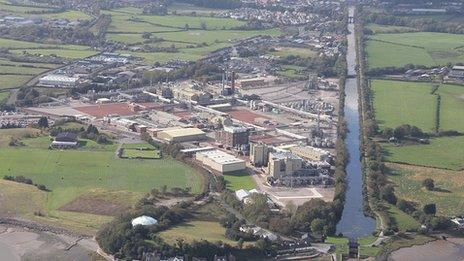
- Published26 March 2012
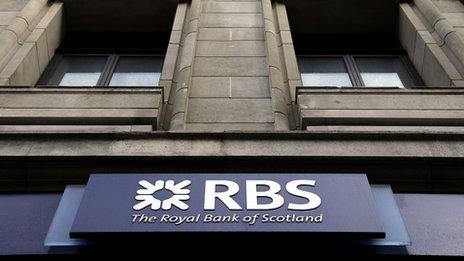
- Published22 March 2012
